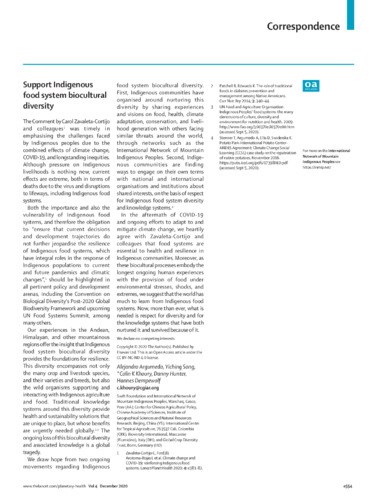Support indigenous food system biocultural diversity
The Comment by Carol Zavaleta-Cortijo and colleagues1 was timely in emphasising the challenges faced by Indigenous peoples due to the combined effects of climate change, COVID-19, and longstanding inequities. Although pressure on Indigenous livelihoods is nothing new, current effects are extreme, both in terms of deaths due to the virus and disruptions to lifeways, including Indigenous food systems. Both the importance and also the vulnerability of Indigenous food systems, and therefore the obligation to “ensure that current decisions and development trajectories do not further jeopardise the resilience of Indigenous food systems, which have integral roles in the response of Indigenous populations to current and future pandemics and climatic changes”,1 should be highlighted in all pertinent policy and development arenas, including the Convention on Biological Diversity's Post-2020 Global Biodiversity Framework and upcoming UN Food Systems Summit, among many others. Our experiences in the Andean, Himalayan, and other mountainous regions offer the insight that Indigenous food system biocultural diversity provides the foundations for resilience. This diversity encompasses not only the many crop and livestock species, and their varieties and breeds, but also the wild organisms supporting and interacting with Indigenous agriculture and food. Traditional knowledge systems around this diversity provide health and sustainability solutions that are unique to place, but whose benefits are urgently needed globally.2, 3 The ongoing loss of this biocultural diversity and associated knowledge is a global tragedy. We draw hope from two ongoing movements regarding Indigenous food system biocultural diversity. First, Indigenous communities have organised around nurturing this diversity by sharing experiences and visions on food, health, climate adaptation, conservation, and livelihood generation with others facing similar threats around the world, through networks such as the International Network of Mountain Indigenous Peoples. Second, Indigenous communities are finding ways to engage on their own terms with national and international organisations and institutions about shared interests, on the basis of respect for Indigenous food system diversity and knowledge systems.4 In the aftermath of COVID-19 and ongoing efforts to adapt to and mitigate climate change, we heartily agree with Zavaleta-Cortijo and colleagues that food systems are essential to health and resilience in Indigenous communities. Moreover, as these biocultural processes embody the longest ongoing human experiences with the provision of food under environmental stresses, shocks, and extremes, we suggest that the world has much to learn from Indigenous food systems. Now, more than ever, what is needed is respect for diversity and for the knowledge systems that have both nurtured it and survived because of it.

